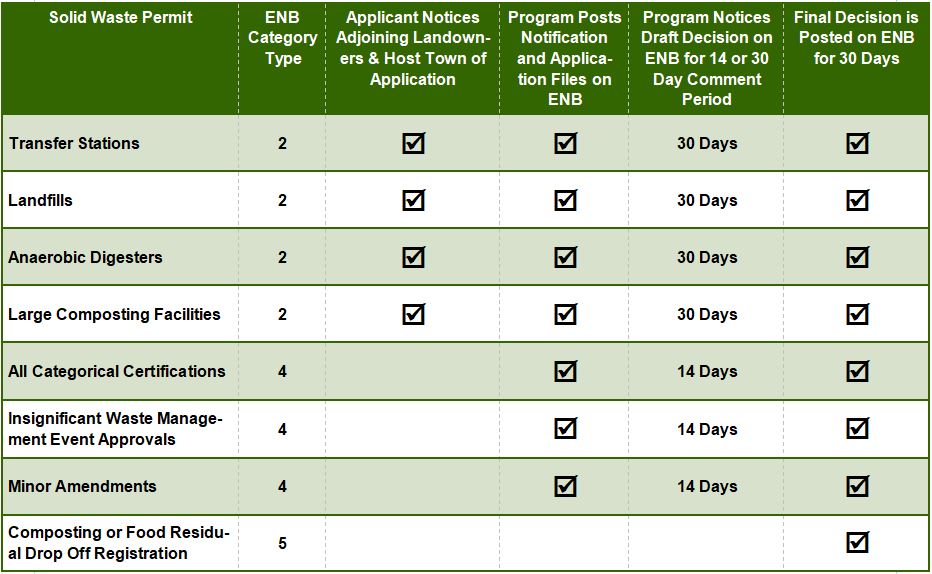Public Notification Process:
With the promulgation of Act 150 on January 1, 2018, the public notice requirements for all Department of Environmental Conservation permitting programs have been simplified. What does this mean for Solid Waste Management Facility applicants?
1. All new and renewal applications for the below noted facility types will need to notify adjoining landowners using the provided letter template. The applicant shall submit a certification of service (including names and addresses of those who received notice) for the public notice to the Program with the application.
2. The Program will then review the application, posting applicable documents and issuing the public notice for all draft decisions through the Environmental Notice Bulletin. The Applicant is no longer responsible for issuing draft certification public notice.
See the table below for a summary of the new streamlined public noticing requirements by application type.
Transfer Stations and Recycling Facilities
All Private Facilities: Applicants are required to complete the following forms in addition to the application: Personal History Disclosure and Business Disclosure Statement
All Facility Applicants (excluding categorical facilities): are required to provide proof of Financial Responsibility and Capability
1. Solid Waste Transfer Station/Recycling Certification: Authorizes an owner/operator to construct and operate a transfer station.
2. Categorical Recycling Facilities: Authorizes an owner/operator to construct and operate a facility that processes more than 50 tons per year of only recyclable materials (no municipal solid waste, etc.).
Landfills and Categorical Disposal Facilities
All Private Facilities: Applicants are required to complete the following forms in addition to the application: Personal History Disclosure and Business Disclosure Statement
All Facility Applicants (excluding categorical facilities): are required to provide proof of Financial Responsibility and Capability
1. Solid Waste Lined Landfill Certification: Authorizes owner/operator to construct/operate a lined landfill for the disposal of municipal solid waste.
2. Closed Landfill: Authorizes owner/operator to re-certify a closed landfill during the post-closure care period.
3. Custodial Care Landfill: Authorizes owner/operator to cease post-closure care and enter custodial care. Refer to the Closed Landfill Custodial Care Guidance Document for additional information.
4. Categorical Disposal: Authorizes owner/operator to construct/operate a disposal facility for certain inert solid waste categories, specified in Section 6-1002(a) of the Solid Waste Management Rules.
Composting Facilities
1. Food Residuals Drop Off Registration: Allows an operator to manage less than 144 gallons of food residuals per week in accordance with Subchapter 12 of the Solid Waste Management Rules. This form may now be completed through the ANR Online system.
2. Small Composting Facility Registration: Authorizes the owner/operator to compost up to 5,000 cubic yards annually in accordance with the Accepted Compost Practices outlined in Section 6-1105 of the Solid Waste Management Rules. This form may now be completed through the ANR Online system.
- Compost feedstocks shall be limited to those listed in the "Approved feedstocks for small facilities registered to operate under acceptable composting practices" procedure.
- Clean high carbon bulking agents shall be limited to those listed in the "Approved clean high carbon bulking agents for use at composting facilities" procedure
3. Medium Composting Facility Categorical Certification: Authorizes the owner/operator to compost up to 40,000 cubic yards annually, in accordance with the requirements established in Sections 6-1106 through 6-1111 of the Solid Waste Management Rules. This form may now be completed through the ANR Online system.
4. Large Composting Facility Full Certification: Authorizes the owner/operator to compost more than 40,000 cubic yards of feedstocks annually, in accordance with the requirements established in Sections 6-1106 through 6-1111 of the Solid Waste Management Rules. This form may now be completed through the ANR Online system.
The operators of all solid waste management composting facilities in Vermont are required to take an approved operator training course. The list of currently approved courses can be found at the following link: Approved Compost Operator Training Courses
Only Large Composting Facility Applicants are required to provide proof of Financial Responsibility and Capability
Anaerobic Digestion Facilities
All Private Facilities: Applicants are required to complete the following forms in addition to the application: Personal History Disclosure and Business Disclosure Statement
All Facility Applicants (excluding categorical facilities): are required to provide proof of Financial Responsibility and Capability
1. Anaerobic Solid Waste Digester Certification: Authorizes an Anaerobic Digestion facility to accept solid waste in accordance with Section 6-1113 of the Solid Waste Management Rules.
Insignificant Waste Management Events and Other Solid Waste Approvals
Attention: Recently promulgated Act 150 requires a minimum 14 day public comment period for all IWMEA applications. Please plan accordingly and submit applications well in advance of your expected start date to accommodate the new public notice requirements.
1. Electronics Collection: These collections no longer need an IWMEA to be issued. See the E-Cycles page for more information.
2. HHW/CEG Collection Events: Authorizes the collection of Household Hazardous Waste and Conditionally Exempt Generator Waste Events. This form may now be completed through the ANR Online System.
3. Paint Collection: Authorizes the approval for collection of paint. This form may now be completed through the ANR Online System.
4. Disposal: Authorizes one-time disposal of certain solid wastes such as stumps, untreated wood, masonry or other inert wastes. This form may now be completed through the ANR Online System.
5. Septic: Authorizes disposal of clogged septic stone. This form may now be completed through the ANR Online System.

